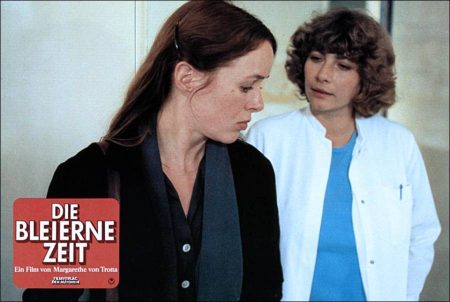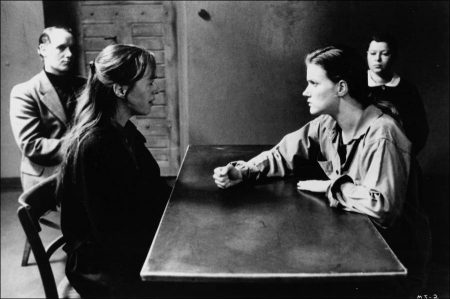Marianne and Juliane movie storyline. Germany, 1968: The priest’s daughters Marianna and Juliane both fight for changes in society, like making abortion legal. However their means are totally different: while Juliane’s committed as a reporter, her sister joins a terroristic organization. After she’s caught by the police and put into isolation jail, Juliane remains as her last connection to the rest of the world. Although she doesn’t accept her sister’s arguments and her boyfriend Wolfgang doesn’t want her to, Juliane keeps on helping her sister. She begins to question the way her sister is treated.
Marianne and Juliane (German: Die Bleierne Zeit), also called The German Sisters in the United Kingdom, is a 1981 West German film directed by Margarethe von Trotta. The screenplay is a fictionalized account of the true lives of Christiane and Gudrun Ensslin. Gudrun, a member of The Red Army Faction, was found dead in her prison cell in Stammheim in 1977. In the film, Von Trotta depicts the two sisters Juliane (Christine) and Marianne (Gudrun) through their friendship and journey to understanding each other.
Marianne and Juliane was von Trotta’s third film and solidified her position as a director of the New German Cinema. Marianne and Juliane also marked the first time that von Trotta worked with Barbara Sukowa. They would go on to work on six more films together.
About the Story
Two sisters choose diverging paths of rebellion against the system. Juliane works as a feminist journalist rallying for womens right to abortion while Marianne commits herself to a violent revolutionary terrorist group. The film quickly informs us that Marianne has abandoned her husband and child to work for a radical terrorist group.
Her husband arrives at the house of Julianne and states that Juliane must take Jan (their son) because the husband has to leave the country for work. Juliane is not supportive of her sisters choices because she feels that it is damaging to the fight for the womens movement. She informs the husband that she does not have time to care for the child. Next the husband steps out to go get something promising to return but instead takes his life leaving Jan without a guardian.
Marianne shows up on the scene to discuss her political views with her sister and urge her to join the movement. Juliane informs her of her husbands suicide and of her intent to find a foster home for Jan. Marianne asks her sister to watch over Jan but Juliane replies you would have me take on the life that you chose to leave.
Basically stating so whats not good enough for you is good enough for me. Juliane sticks by her guns and refuses to take on Jan. This fact still doses not stop Marianne from continuing on in the movement. She is content to allow Jan to have the life that will be dealt to him through foster care because she believes that any life he has in foster care will be better then the life many children have in third world countries.
The sisters paths continue to cross as Marianne bursts in unannounced to her sisters life. The last time that Juliane sees her sister before she is arrested Marianne wakes her and her long-term boyfriend up at 3a.m. and wants to make coffee and take Julianes clothes. We soon discover that her sister has been arrested and is being held in a high security prison. Juliane goes to visit her sister. When she arrives at the prison she is ordered to strip down and is searched. Then she is let into the waiting room and told to wait for her sister. The guard returns and informs her that Marianne refuses to see her.
Juliane goes home agonizing over her inability to communicate with her sister and see how she is doing. Her boyfriend suggests that she write a letter to her sister telling her how she feels. The film goes into a flashback of their childhood where we see the closeness of the sisters. Juliane mails the letter and soon after is able to visit with her sister. They argue often but Juliane continues to come and visit her sister. They have a bad argument on one of these occasions and Marianne slaps her sister. Marianne is then moved to a maximum-security prison where the two must sit on the opposite sides of a pain of glass and communicate through intercom.
Marianne and Juliane (1981)
Directed by: Margarethe von Trotta
Starring: Jutta Lampe, Barbara Sukowa, Doris Schade, Luc Bondy, Rüdiger Vogler, Vérénice Rudolph, Franz Rudnick, Julia Biedermann, Margit Czenki, Ina Robinski, Rebecca Paepcke
Screenplay by: Margarethe von Trotta
Production Design by: Barbara Kloth, Georg von Kieseritzky
Cinematography by: Franz Rath
Film Editing by: Dagmar Hirtz
Costume Design by: Monika Hasse, Jorge Jara
Makeup Department: Bernd-Rüdiger Knoll
Music by: Nicolas Economou
MPAA Rating: None.
Distributed by: Filmverlag der Autoren (West Germany), New Yorker Films (USA)
Release Date: September 25, 1981 (West Germany), November 1981 (United States)
Views: 319


